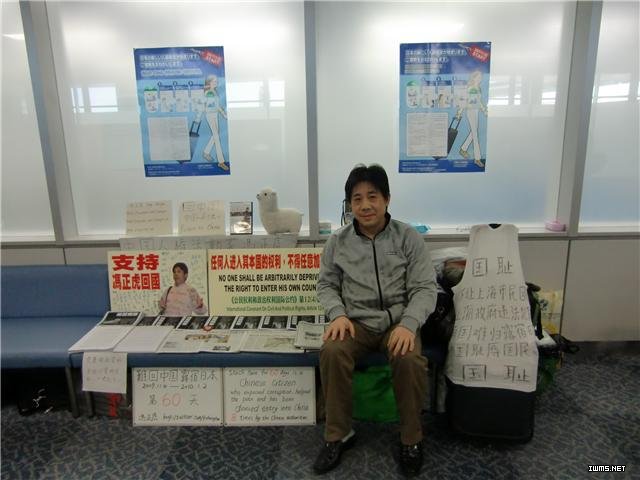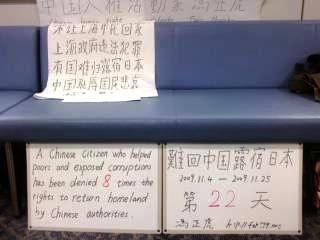After he was denied re-entry to China eight times, Feng Zhenghu lived in Tokyo’s Narita Airport for 92 days in 2009-2010. Now Feng is telling the story of his airport odyssey on his blog, and CDT is translating his account.
This is part 23. Read previous installments here.
November 25, 2009
Before going to bed I set my phone to vibrate. Alone in the empty immigration hall, the ringing of non-stop phone calls and text messages seems out of place.
Just after midnight last night, my phone began to vibrate beside my pillow. The call was from the United States. It was Mr. Chen Kuide on the line, asking me how I was doing. I hadn’t spoken to him for twenty-some years, having met him in 1983 while studying for my masters in economic administration at Fudan University. At that time, Chen already had his Ph.D. and was teaching in the philosophy department, and I was a well-known student activist, serving as the vice-chairman of operations for the Fudan graduate student association. At the same time, I was also director of the graduate student committee of the Shanghai Student Federation. I later gave up this post to the chairperson of the Jiaotong University graduate association, Cao Jianming, who today is the head prosecutor of the Supreme People’s Protectorate. Back then, Cao was chair and member of the graduate student committee at East China University of Political Science and Law. Chen Kuide was a scholar who worked on theories. Along with Zhou Yicheng, Yu Wujin, and another professor whose name I forget, Chen was known for being one of the “Four Gentlemen of Fudan.” After June 4th the four of them parted ways, with Chen and Zhou going into academia, publishing in the U.S., and getting involved in the democracy movement. The other two stayed in China, becoming honored guests of the local authorities.
At a little past five in the morning, still groggy from a lack of sleep, I sensed that someone was standing at the head of my “bed.” I twisted around to look, and found the head inspector of the immigration control office copying down the English on my whiteboards. When he saw me looking at him, he said “good morning.” “Good morning,” I replied, and turned back around to let him finish copying the signs in peace. This was his job after all, to report to his superiors, so there was no reason to disturb him.
I recently acquired two whiteboards, which I can update whenever I like. The mix of Chinese and English seemed to bother the head inspector. The previous evening he had stopped by to remark that I was accumulating more and more things. I replied, “I haven’t taken up more than a single bench’s worth of space.” “You can put up T-shirts and posters,” he said, “but you will need to take down the whiteboards.” “Why do I have to take them down? If I take down the posters and replace them with whiteboards, they’ll take up about the same amount of space. Is this decision your own, or from above? Please put me in contact with the manager in charge to discuss this.” “It wasn’t my decision.” Having said his piece, he left.
At 6:20 I was still lying in “bed” when someone suddenly pushed a bag of something up against my pillow. I lifted my head and saw that it was a Japanese man. He was already leaving, headed to work. I got out of bed and made a quick survey of the bag’s contents. Inside were two small loaves of fresh bread, enough for two meals, in addition to a toothbrush and other toiletries. Since meeting him in the airport the evening of November 8 the man and I have become good friends. He often comes, quietly bringing me food and other necessities.
At 8:50, Tong Jie called me from Washington, D.C.. He was about to board a flight to Germany to give a lecture. We had been graduate students together at Fudan twenty years ago, where he studied nuclear physics. At the time he was also serving as vice chairman of the Fudan graduate student association, and proved himself a capable partner. Later on he was investigated for his involvement in June 4th, and so he went to Europe to earn his Ph.D.. Afterwards he became a professor in the U.S. He wasn’t involved in politics, choosing instead to focus on his research. We had long since fallen out of touch, but he had heard about my story through the news and soon figured out a way to get in touch with me. “You’re doing the right thing,” he told me.
At noon, Mr. Yoneda from the Department of Immigration brought a Chinese interpreter to discuss things with me. Usually when we speak we don’t need a translator, but for official business an interpreter has to be on site to avoid misunderstandings. He said, “Please don’t place your signs on the ledge of our office windows. The messages on our windows need to be officially vetted and approved. If you place them on your luggage, the floor, or hold them in your hands there is nothing we can do to stop you.” He gave several other reasons for the change, and asked for my understanding, not wanting to make things difficult for me. He was afraid that my signs would get larger and larger. I understood his point of view, and decided to go along with his request. I said, “This is my home, so I will do my best to keep it clean and tidy.” Joking, I continued, “Eventually I’ll pay rent for the these two square meters that you are giving me. I don’t have any money right now, but if each Chinese person who supports me gives a little money, then I will have plenty.” He laughed and we ended our discussion on a friendly note. After he left, I redecorated my home, taking down the whiteboards from the windows and placing them on the seats, where they are equally eye-catching. They also block from view the food I’m storing under the bench, improving the atmosphere of the immigration hall.
At 3:00, a reporter from the Japanese branch of the Epoch Times was escorted to the official interview zone on the fourth floor of the airport, and I ascended from the second floor to be interviewed by him. I answered all of the reporter’s questions honestly. Epoch Times is organized by followers of Falun Gong, so they will bring a different perspective to my problems. Among the Chinese media in Japan, Epoch Times was the earliest to start reporting the sensational story of my struggle to return home. The other Chinese media outlets, meanwhile, had only just started to become aware of the story.
At 4:30 I was interviewed live on Radio Taiwan International for about an hour.
At 6:00 a group of flight attendants from an American airline passed by my temporary lodgings on their return to Japan. One man gave me a big bottle of purified water from the US, and a middle-aged woman brought me a basket of fruit, with bananas and apples. Another woman took out a bag which she also gave to me. Inside was a carton of apple juice, a big Swiss chocolate bar, and a roll of crackers. They had probably heard of my story in the American news. When they left, they wished me, “Good luck!” in English.
By now I have plenty of food and clean clothing to change into, thanks to my overseas friends who’ve set up a time delayed air shipping plan to Tokyo. Many others have decided to help right on the spot, giving me things while they walking past my temporary home. There is no way for me to refuse them, since it was an expression of their care and concern for me. Of course, the most helpful thing travellers can do for me is offer a smile and pass on my story of repatriation. This serves as an expression of their concern for the human rights of the Chinese people.
At 6:20, I received a phone call from China. A complete stranger had composed a song for me on behalf of the people of Shanghai, to accompany me through the long night. He asked me to record him via the telephone, first reading the lyrics, and then playing the music. When the phone call had ended, I thought that I’d recorded the song, but it turned out that I hadn’t–I had forgotten to press the ‘record’ button. I still didn’t know how to use my new phone. I hadn’t been able to hear the lyrics clearly, but I sat quietly and listened to through the receiver, and thanked him. If I have the chance, I’d like to ask him to play the song for me again. [Chinese]
Translation by Nick.








